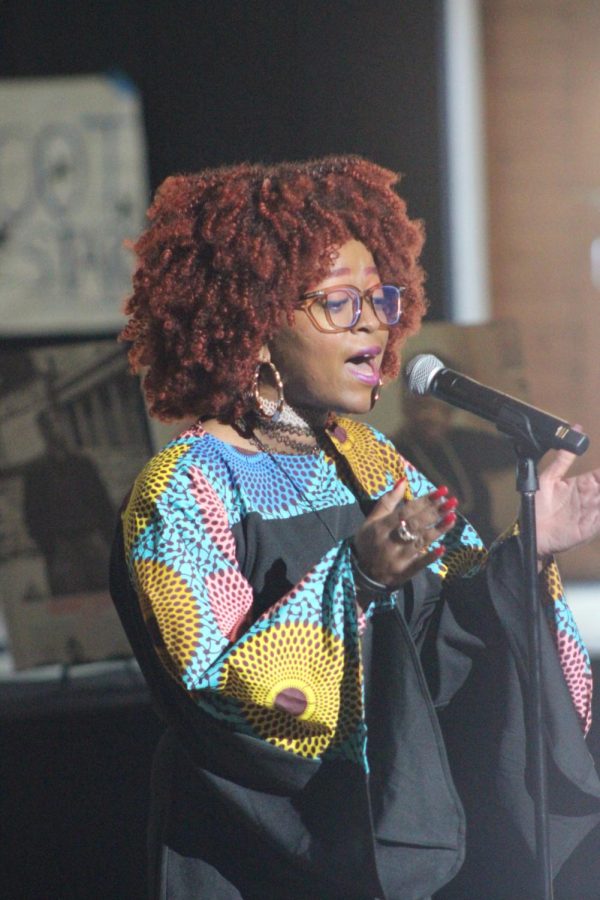The Song of Resilience
Blues singer and spoken-word artist Shy but Flyy shares a spoken word performance on February 8.
March 16, 2023
Black History Month is a time to commemorate the contributions of Black individuals in the United States. Although this month for reflection originated in the U.S., Canada, the United Kingdom, and Ireland also recognize it. While it is important to acknowledge, learn about, and dissect the obstacles to equality and equity black people have faced, it is critical to celebrate and uplift their accomplishments as well. Many Americans have knowledge of the treacherous trans-Atlantic slave trade, Jim Crow laws, and leaders of the Civil Rights Movement like Martin Luther King, Jr., and information regarding Harriet Tubman’s underground railroad and Malcolm X’s advocacy of Black empowerment decorates school textbooks. However, the indelible impact Black musicians have had on American pop culture is often unheralded. From soulful blues to toe-tapping jazz, Black musicians have helped shape the lively, diverse musical world. This Black History Month, SAME aims to highlight the influence of many of these incredible voices.
Born in the Deep South amidst an atmosphere of institutionalized racism and hateful rhetoric, blues music made its first appearance in the U.S. in the late 19th century, and took root in the 20th century. Characterized by intense emotion, this African-American-created music inspired countless individuals and influenced the creation of other genres like jazz, rock, and country music. Many notable blues songs such as “Uncle Sam Says” by Joshua White and Maggie Jones’s “Northbound Blues” discussed the adversity Black Americans faced because of oppression. Despite these turbulent challenges, Black artists did not shy away from utilizing music as a form of self-expression and transforming the music industry. Famed blues singer Etta James broke racial barriers and gained popularity through her hit songs. Despite constant discrimination, she persisted in her work and continued to become an indispensable figure in connecting the aforementioned genres of music with blues music. Like James, many other blues artists defied racial restrictions and defined their roles in American pop culture as trailblazers.
In addition to molding blues music, Black artists transformed the jazz world. One of the giants of American music in the 20th century was jazz musician Louis Armstrong. His trademark gravelly voice and masterful improvisations on trumpet made him an influential figure of the jazz movement. His songs, like “What a Wonderful World” and “Dream a Little Dream of Me,” are timeless classics and undisputed staples of American music. Duke Ellington, a pianist and composer, showcased the dynamic sounds of the American orchestra and defined big band music. Another exemplary figure is Ella Fitzgerald, a singer often referred to as the “First Lady of Song.” She won fourteen Grammy awards in her 50-year-long career and sold over 40 million albums.
Throughout American history, Black musicians have fought against acts of prejudice that pervade American society to emerge as significant figures in the music industry. The influence of iconic African American artists is not one of the past; Black singers continue to help create America’s musical identity. Individuals like Beyoncé and Drake bring new ideas to music while paving the way for future Black artists. Historically, Black singers have used music as a crucial mode of activism, expression, and a way to bring people together. While they have produced a range of noteworthy songs, there is one theme that unites them all: the song of resilience.


